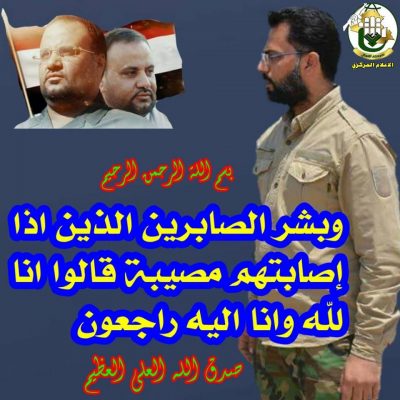
Eulogy poster of Saleh al Sammad made by Iraqi Shia militia Harakat al Abdal
Prominent figures in the network led by the Islamic Revolutionary Guards Corps (IRGC) have eulogized Saleh al Sammad, the Houthi (Ansar Allah) movement’s political leader, who was slain in an April 19 airstrike launched by Saudi Arabia in the Yemeni city of Hudaydah.
The Houthi insurgent group announced al Sammad’s death on Monday. Saudi officials later confirmed the targeted strike. Shortly after the announcement, Iran’s Foreign Ministry released a statement condemning the killing of Sammad. Ali Shamkhani, the secretary of Iran’s Supreme National Security Council, released a statement of his own praising the life and work of al Sammad while also offering Iran’s condolences to Yemen and the Houthis. After the Iranian communications, members of the IRGC network then released their own, one by one.
Sammad was a senior Houthi leader and the head of the Supreme Political Council, thus making him the acting president in Houthi-controlled areas of Yemen. The Houthi’s overall leader is Abdel Malek al Houthi and his movement is supported by Iran. However, the Houthis, also known as Ansar Allah, are not thought to be directly subordinate to Tehran like Lebanese Hezbollah or other proxies.
Iran, and it’s proxy Lebanese Hezbollah, support the movement with weapons, training, and money. The IRGC’s strategy with the Houthis appears to be based around exploiting the war in Yemen with the goal, among others, of making the Houthis more dependent on Iran.
Houthis propaganda output over the past year have expressed more pro-IRGC tendencies. For example, Abdel Malek al Houthi has twice spoken publicly of sending his forces to fight alongside Hezbollah and other Shia militias in the event of a new war with Israel. The eulogies and statements sent by other IRGC-linked figures and militias, as well as past expressions of solidarity with Yemen and the Houthis, also show the Houthi’s role in the proclaimed “axis of resistance.” The “axis” refers to a network of state and non-state actors led by Iran that operates against the United States and its allies in the Middle East and beyond.
Lebanese Hezbollah issued its own eulogy, saying that Sammad was an “exceptional man, who took responsibility in the most difficult phase and faced the most aggression in the region.” The statement also said that Sammad “achieved his most precious hopes and became a martyr in his land, which he defended his people whom he loved and stayed with until the last inch of his life.”
Others followed, including Qais al Khazali, the leader of the Iraqi Shia militia Asa’ib Ahl al Haq, who later tweeted: “When the Saudi regime learns that it cannot break the will and steadfastness of the Yemeni people with massacres and transgressions and that its aggression will be its end…because the Yemeni people are simply a people that cannot be broken.”
Harakat al Abdal, another Iraqi Shia militia, also released a eulogy of Sammad on Monday. In the statement, the militia sends its condolences to the Houthi movement and “the people of Yemen” on the death of Sammad. It also chastised what it called “Saudi-American oppression against the steadfast Yemeni people.”
On Tuesday, three prominent Iraqi Shia militias, Harakat al Nujaba, Kata’ib Hezbollah, and Kata’ib Sayyid al Shuhada, all each released their own statements on the death of Sammad. A spokesman of Harakat al Nujaba said that “the blood of the martyred leaders will increase the will and determination of the Yemeni people in the face of the Saudi-American coalition.”







